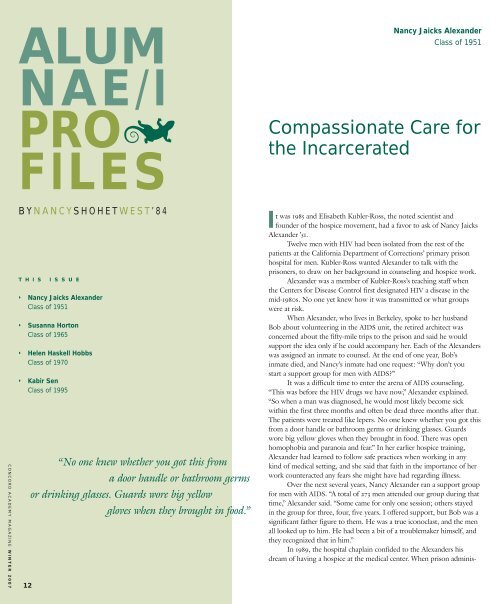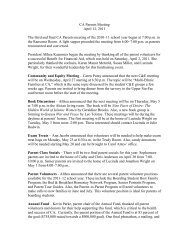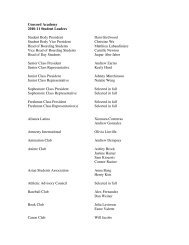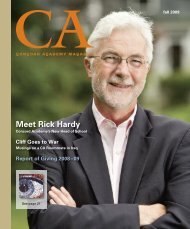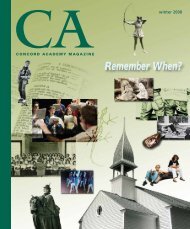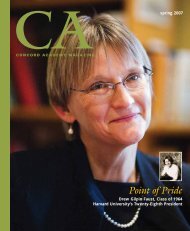ALUMNAE/IPROFILESNancy Jaicks AlexanderClass of 1951Compassionate Care forthe IncarceratedCONCORD ACADEMY MAGAZINE WINTER <strong>2007</strong>BYNANCYSHOHETWEST’84T H I S I S S U E• Nancy Jaicks AlexanderClass of 1951• Susanna HortonClass of 1965• Helen Haskell HobbsClass of 1970• Kabir SenClass of 199512“No one knew whether you got this froma door handle or bathroom germsor drinking glasses. Guards wore big yellowgloves when they brought in food.”It was 1985 and Elisabeth Kubler-Ross, the noted scientist andfounder of the hospice movement, had a favor to ask of Nancy JaicksAlexander ’51.Twelve men with HIV had been isolated from the rest of thepatients at the California Department of Corrections’ primary prisonhospital for men. Kubler-Ross wanted Alexander to talk with theprisoners, to draw on her background in counseling and hospice work.Alexander was a member of Kubler-Ross’s teaching staff whenthe Centers for Disease Control first designated HIV a disease in themid-1980s. No one yet knew how it was transmitted or what groupswere at risk.When Alexander, who lives in Berkeley, spoke to her husbandBob about volunteering in the AIDS unit, the retired architect wasconcerned about the fifty-mile trips to the prison and said he wouldsupport the idea only if he could accompany her. Each of the Alexanderswas assigned an inmate to counsel. At the end of one year, Bob’sinmate died, and Nancy’s inmate had one request: “Why don’t youstart a support group for men with AIDS?”It was a difficult time to enter the arena of AIDS counseling.“This was before the HIV drugs we have now,” Alexander explained.“So when a man was diagnosed, he would most likely become sickwithin the first three months and often be dead three months after that.The patients were treated like lepers. No one knew whether you got thisfrom a door handle or bathroom germs or drinking glasses. Guardswore big yellow gloves when they brought in food. There was openhomophobia and paranoia and fear.” In her earlier hospice training,Alexander had learned to follow safe practices when working in anykind of medical setting, and she said that faith in the importance of herwork counteracted any fears she might have had regarding illness.Over the next several years, Nancy Alexander ran a support groupfor men with AIDS. “A total of 273 men attended our group during thattime,” Alexander said. “Some came for only one session; others stayedin the group for three, four, five years. I offered support, but Bob was asignificant father figure to them. He was a true iconoclast, and the menall looked up to him. He had been a bit of a troublemaker himself, andthey recognized that in him.”In 1989, the hospital chaplain confided to the Alexanders hisdream of having a hospice at the medical center. When prison adminis-
Susanna HortonClass of 1965Ancient Medicine,Modern Miracles“Each case is a mystery, a puzzle.Studying medicine gives youthe tools to solve a puzzle.”Nancy Jaicks Alexander ’51trators finally approved the idea eighteen months later, Nancy Alexanderoffered to train prisoners in hospice counseling. “Once trained, theseinmates could visit with other prisoners who were close to death,” sheexplained. “The whole idea was that no man should die alone in prison.”Now, fifteen years after she trained that first group of volunteers, thefacility is a seventeen-bed, state-of-the-art, fully accredited hospicewithin the prison. It is named for Bob Alexander, who died in 1992,shortly after helping to launch the program.Today there are forty inmate hospice volunteers, and althoughAlexander is retired, she travels once a week to participate in theirongoing training and support. “I’ve done this for twenty years now,” shesaid. “I believe in rehabilitation and compassion.”The hospice program, she points out, is a way of bringing outthese qualities in both the men who are ill and the men who counselthem. “If I looked at every man and wondered what he was incarceratedfor, I never would be able to do the work I’m doing,” she said. “My goalis to seek out and communicate with the heart of that person and thegoodness in that person. It’s astonishing to talk to the ‘lifers’ who havebecome hospice volunteers. The appreciation of their fellow inmatescompletely changes their self-perception. They realize that they are notall bad, that they can do good in the world. That’s why I’m there.”Alternative approaches to medicine that are just now beingaccepted by the mainstream medical community are nothing newto Susanna Horton ’65.Long feeling that she possessed a special healing energy, Hortonbegan working in a holistic medical center in 1995, where she learnedabout acupuncture and Chinese medicine. She had already completed afour-year course in polarity therapy, which focuses on healing throughthe chakra energy system developed in ancient India. Through acupuncture,she saw a way to channel her healing energies in a medical direction,and began formal acupuncture training at a school of traditionalOriental medicine in California.“Starting medical school at age fifty was very challenging,” shesaid. “My energies were not exactly at their peak. And yet I discovered Ihad a passion for medical studies.” Horton relearned chemistry, biochemistry,and other sciences, but most enjoyed analyzing medical cases.“Each case is a mystery, a puzzle,” she said. “Studying medicine givesyou the tools to solve a puzzle.”Upon completing her master’s degree in acupuncture, Hortonhad planned an oncology specialty, but an unexpected opportunity arosein a fertility practice. “I started there just to fill in for someone whowent on vacation, but it turned into a permanent job because the physiciansquickly saw the results of my work—how the patients respondedmentally and emotionally,” she said. “Undergoing fertility treatments isvery stressful. The women I did acupuncture with became more positiveand less stressed, and ended up with better results.”Horton recalled one patient who sought treatment after sufferinga series of miscarriages and unsuccessful in vitro fertilization. “When Istarted working with her, she was haggard and depressed. I put every-13WWW.CONCORDACADEMY.ORG WINTER <strong>2007</strong>


